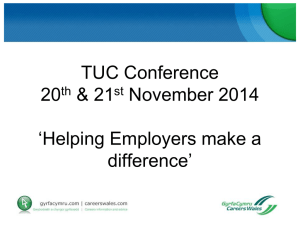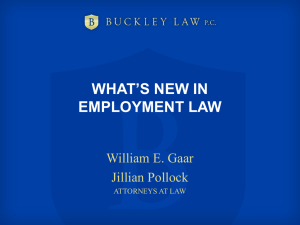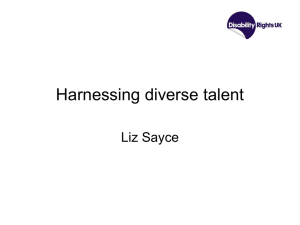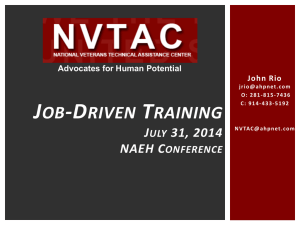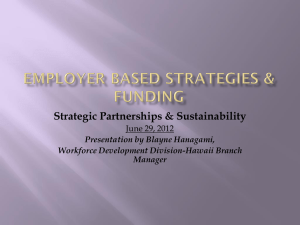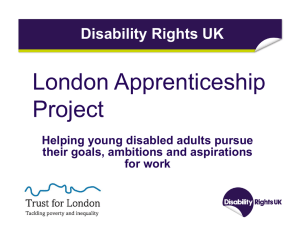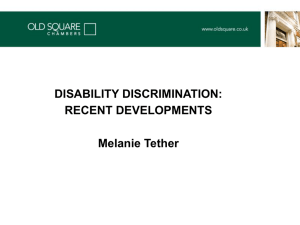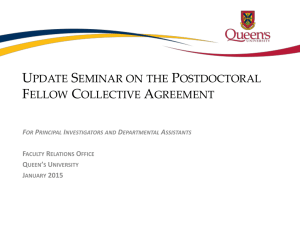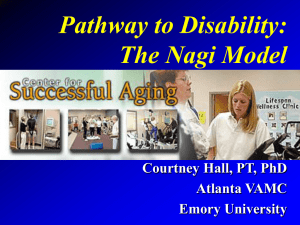Disclosure in the recruitment process
advertisement
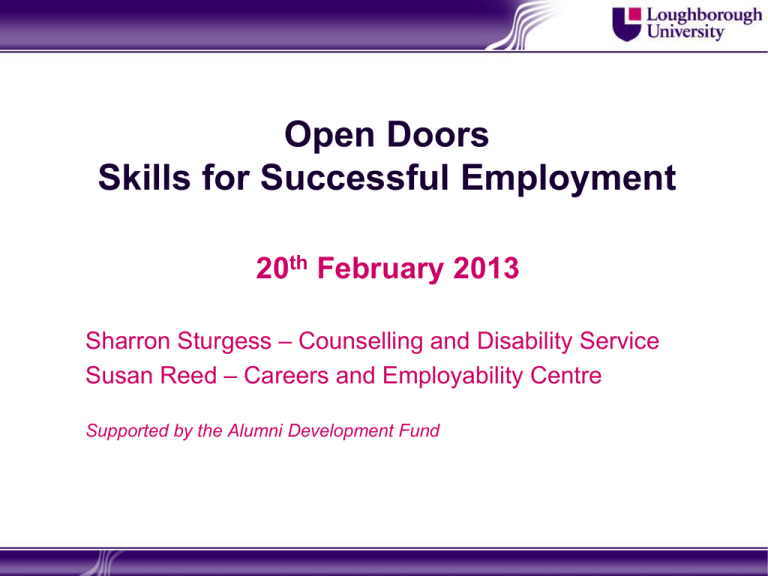
Open Doors Skills for Successful Employment 20th February 2013 Sharron Sturgess – Counselling and Disability Service Susan Reed – Careers and Employability Centre Supported by the Alumni Development Fund Welcome Housekeeping Plan for the day Exhibitors and refreshments Evaluation and feedback Background to the event June 2012 - Joint working between CDS and CEC to look at employment issues for disabled students Decided on an event and resources Summer 2012 - Applied for funding from Alumni Development Trust February 2013 – Open Doors event Easter 2013 – development of on line resources Ice Breaker In pairs your have 1 minute to find out the name of your partner and share an interesting fact about yourself. Be prepared to share one of your facts with the whole group! Disclosing a disability in the Recruitment Process Presenters: Karen Watts (Mental Health Support Team) Natalie McKeown (Disability Office) Sharron Sturgess (Disability Office) Outline of the session Your rights under the law Reasons for disclosure – group exercise When to disclose Case study Question and answer How does the law define disability? The Equality Act (2010) defines a disability as: “A physical or mental impairment that has a substantial and long-term effect on a person’s ability to carry out normal day-to-day activities.” Long-term means has lasted or is likely to last 12 months or more. What type of disabilities does the law cover? Visual impairment, MS, Cancer and HIV are automatically covered, but the law potentially also covers the following; Dyslexia, dyspraxia, dyscalculia, AD(H)D Mental health difficulties (including depression, anxiety, eating disorders) Physical disabilities Deaf/Hard of Hearing Medical conditions (including Chron’s disease, Chronic Fatigue Syndrome, epilepsy, diabetes etc) Asperger’s Syndrome/Autistic Spectrum Conditions What rights do applicants have under the law? Employers cannot reject an application solely on the grounds of disability. In general terms, employers cannot ask about health or disability unless or until they offer you a job. This includes questions about previous sickness or absence. BUT, there are some exceptions.... Some exceptions Employers can ask about health or disability during recruitment only for the following reasons... To establish if an applicant can take part in the recruitment process; To establish if any adjustments need to be made to the recruitment process; To find out if the applicant would be able to carry out a task intrinsic to the job; For monitoring purposes (data should then be held separately); To take positive action; If there is an occupational requirement for the person to be disabled. What if you think an employer has discriminated against you? If on placement you can contact the Careers and Employability Centre for advice. You can call the Equality Advisory Support Service (EASS) on 0808 800 0082. Contact the Disability Law Service (charitable organisation) for advice on 020 7791 9800 You can make a complaint to the Equality and Human Rights Commission (EHRC) http://www.equalityhumanrights.com/ Employer Responsibilities post-offer Once an employer has offered a position they also have duties towards disabled employees: To ensure reasonable adjustments are considered (potentially via Occupational Health) To ensure disabled staff are not treated less favourably To ensure disabled staff are not harassed Group Exercise Why might you choose to disclose a disability in the recruitment process? Why might you not choose to disclose a disability in the recruitment process? Reasons for Disclosure Protection under the law Proactive approach – you can present your disability confidently and positively Positive employers – employers who focus on your ability rather than disability Equal Opportunities Policy Job Centre Plus ‘two ticks’ symbol Employers’ Forum on Disability Reasons for Disclosure 2 • The employer is prepared which can be very useful e.g. arrangements can be made for extra time for psychometric tests if you have dyslexia. • Are there health and safety implications? • You maybe eligible for funding through Access to Work to cover extra costs at work e.g. specialist equipment or adaptations. • Employers often use equal opportunities monitoring forms which are detached before reaching the recruiter. Reasons Against Disclosure The fear of potential discrimination Labelling Your disability or condition is not relevant to your ability to do the job so why bother disclosing? Competition for jobs, the job market is too competitive and disclosing may make you appear less employable than the next applicant When Should I Disclose? Consider your own situation in making your decision when to disclose. Options: Application form – however, this is the first contact you will have with the employer. You could use the supporting statement or competency based questions Equal opportunity monitoring form CV/covering letter – covering letter could be a good place Assessment Centre – tell the employer in advance At a later stage – after the job offer or when you have started work Case Study • Background • Work placement arrangements • What we can do • Positive Outcomes.... Background 1 in 6 people experience mental health difficulties in any given week (New Horizons, 2010) A student being supported by the Mental Health Support Team, attempting to find a 3rd year work placement. With a history of depression, anxiety and OCD, the student gave careful consideration to the potential employer and the role to be undertaken. Previous employment experiences had ended badly due to issues relating to mental health difficulties. No disclosure had been made, therefore employer support was not forthcoming. The Work Placement Arrangements 60% of people with mental health difficulties say they have been put off applying for a job as they expect to be dealt with unfairly (Social Exclusion Unit, 2004) After receiving a conditional offer from an employer, the student also received a health questionnaire. After discussion, the student decided that in order to receive the correct support from both the University and the employer, disclosure would be made. From this, the employer was able to assess the students needs. What we can do There are a number of factors which support a healthy and productive workplace (MindFul Employer, 2007) In cases where difficult decisions about disclosure have to be made, we can talk through the benefits of disclosing and the advantages that might come from it. We can ensure that students are aware of their rights under the Equality act. We can help to inform the employer of possible reasonable reactionary or anticipatory adjustment considering the individuals needs. Discuss supervision requirements with placement supervisors. Positive Outcomes “ A positive outcome to the disclosure process should be the aim for both employers and employees. Some of the things we might expect from disclosure are: Support and understanding from managers and supervisors Less pressure, therefore reduced anxiety Assessment – consideration of task performance in relation to difficulties Adjustments, eg. Part-time work, flexibility, time off for appointments, increased supervision Committed employees Positive experiences of employment. A more healthy workforce. Further resources Government Equalities Office Guide, available at: www.homeoffice.gov.uk/publications/equalities/equality -act-publications/equality-act-guidance/employmenthealth-questions?view=Binary Employers Forum on Disability – www.employersforum.co.uk, employers with a positive approach to recruitment. Equality and Human Rights Commission (EHRC), www.equalityhumanrights.com/ Careers and Employability Centre website www.careers.lboro.ac.uk includes a section for disabled students. Useful Contacts Disability Office Email: disability@lboro.ac.uk Tel: (01509) 222770 Drop in: Mondays 12.30-1.30, Wednesdays 12.30-2.30 , Fridays 12.30-1.30 in K104 (Manzoni) Mental Health Support Team Email: mhst@lboro.ac.uk Tel: (01509) 228338 Careers and Employability Centre Email: careers@lboro.ac.uk Tel: (01509) 222052
